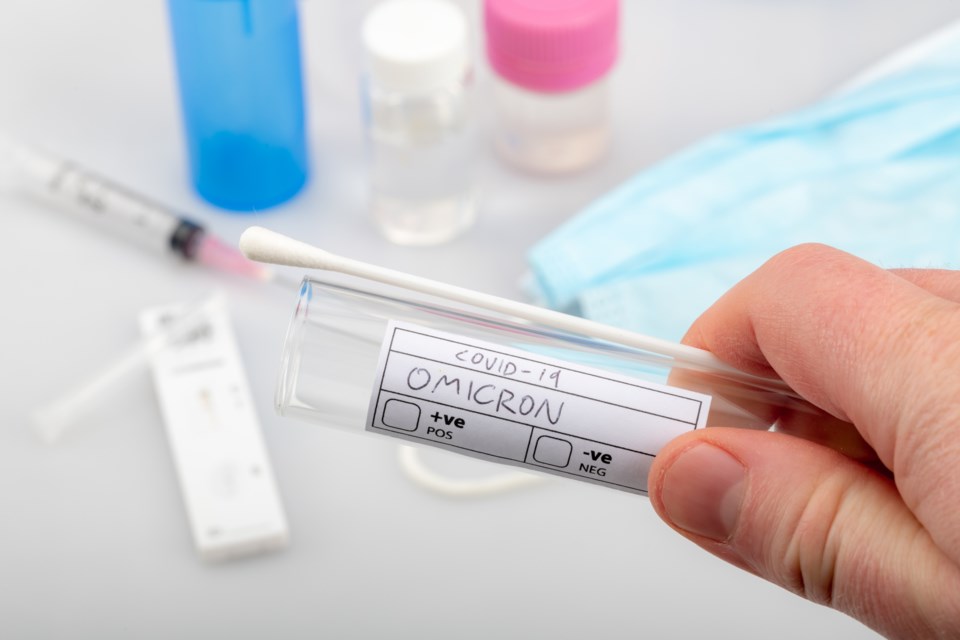Just when we thought we knew how to cope with the coronavirus, Omicron has changed everything.
Our capacity for testing and contact tracing is overwhelmed.
But don’t get mad at our local health authorities.
This is the case across North America and around the globe. In the past week, the rate of new infections has almost doubled around the world.
Omicron – now the dominant variant in B.C. – is a game-changer.
With its shorter median incubation time (from exposure to symptoms) of three days, greater capacity to spread from person to person and a most highly contagious period beginning from one or two days before the onset of symptoms, Omicron may soon affect every family.
Cloth masks and even surgical masks are no longer sufficient to protect you while you are shopping or in other indoor places.
The good news is that the Omicron variant appears to cause less severe illness than Delta, at least in the vaccinated. But don’t call this a mild illness (unless you consider a severe flu-like illness to be mild).
The other potential good news is that with this Omicron surge, we may be seeing the beginning of the end of the pandemic. Through the combination of Omicron’s rapid spread in every community and increasing COVID-19 vaccinations (including boosters as close as possible to six months after the second shot), we may achieve population immunity to the coronavirus.
So why not allow Omicron to spread at its current pace?
Although this variant is almost unavoidable in our daily lives and appears “milder,” the most vulnerable – including the immune compromised, the unvaccinated (including children under five), the elderly and others more clinically vulnerable may become sick enough for hospitalization.
If we allow cases to continue to rise, our ERs and ICUs will be overwhelmed. We will not be able to look after all the patients with respiratory failure due to COVID-19 in addition to the many other critically ill patients who require the same resources.
This will have a tsunami effect on the entire health-care system, affecting all of us, including those who have been awaiting surgery for debilitating painful hip joints, vision limiting cataracts and other elective but necessary surgery.
Omicron is affecting every workplace and school. As it spreads, it will put a strain on every business with increasing numbers of employees off work. We’ve already seen flights cancelled due to illness among the flight crew.
We need time to fully vaccinate and give boosters to as many as possible to reduce the severity of disease in those who are exposed.
This is the time not only to consider your goals and resolutions for the New Year but to revise your personal pandemic strategy.
1. Upgrade your face mask to the more effective N95 or KN95.
2. Get your booster shot as soon as you receive your notification.
3. Limit your exposure out of the home. This weekend, while swimming at our local pool (keeping my face underwater or masked when close to others), I was shocked to see the number of elders unmasked sitting in the sauna. Through the glass window, it looked like an early pandemic test for vaccination effectiveness.
4. Limit your social circle. Remember that COVID-19 is the new STI (socially transmitted disease). Share the air with one person and you’ve just shared the air (and airborne germs) with everyone they’ve met with in the past few days. Wear your (N95) protection or abstain.
5. If you have a scratchy throat, new headache, muscle aches or any of the other non-specific symptoms of COVID-19, self-isolate the minimum of five days recommended (though seven to 10 days is even safer) and wear an N95 mask when around others at least a full 10 days after symptoms started.
In an ideal world, you would be able to access a rapid antigen test after day five before ending self-isolation, but testing sites are not currently able to keep up with the initial diagnoses of COVID-19 infections.
Use the CDC guidelines for self-monitoring and call your family doctor if you have any questions or concerns. http://www.bccdc.ca/health-info/diseases-conditions/covid-19/self-isolation
In life, there are always circumstances beyond our control, but with up-to-date knowledge and support, we can make choices to cope, survive and thrive.
I’ll be giving a free online talk on Keys to Positive Change at 7 p.m. on Thursday, Jan. 20, as part of the Burnaby Division of Family Practice’s Empowering Patients public health education program.
I’ll share practical tips for improving your wellbeing and making positive changes that last. These are the secrets that my patients and I have successfully used to transform new habits into healthy routines that stick.
For more information or to sign up, please check https://divisionsbc.ca/burnaby/for-patients/empowering-patients
Dr. Davidicus Wong is a family physician. His Healthwise Column appears regularly in this paper. For more on achieving your positive potential in health, read his blog at davidicuswong.wordpress.com.



